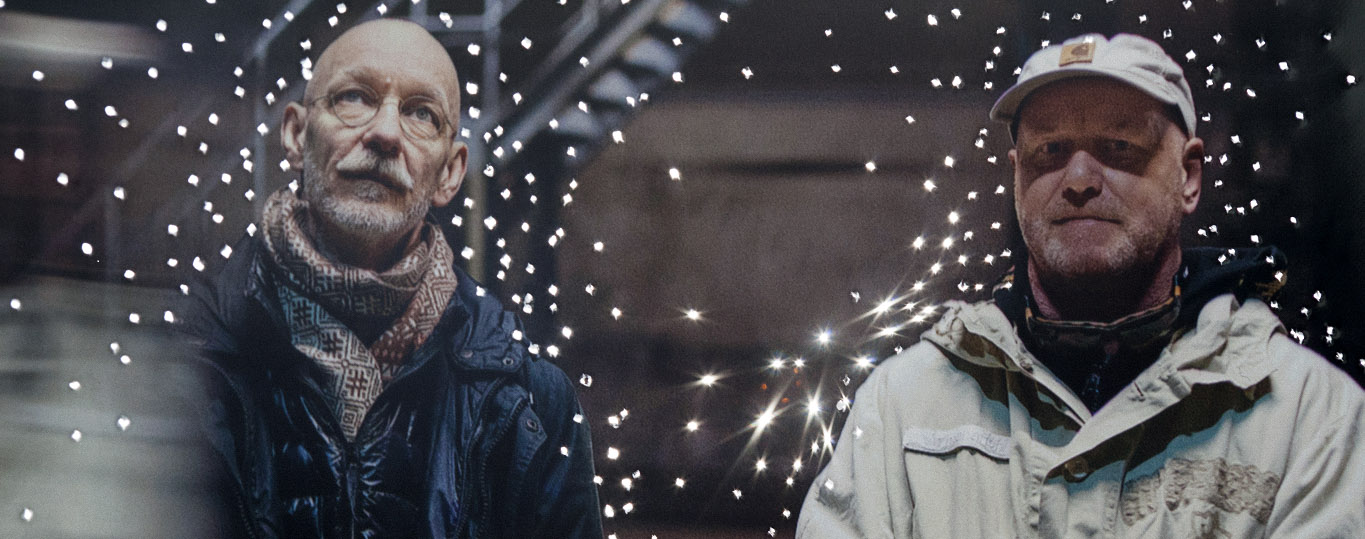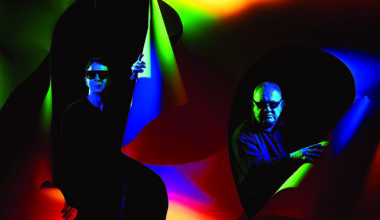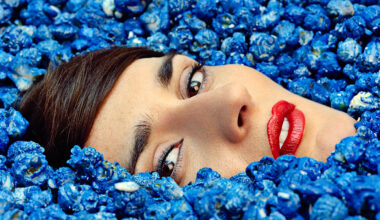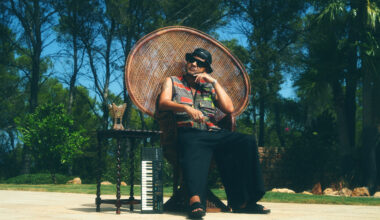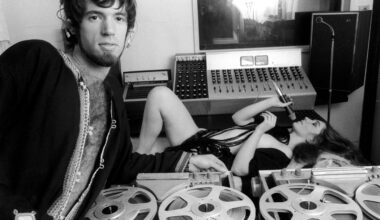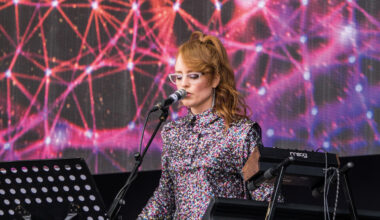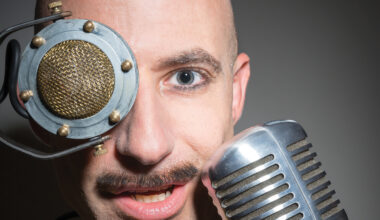Alex Paterson has been Chief Space Cadet of The Orb for more than 25 years, piloting the chill-out pioneers to parts of the universe nobody else even knew existed. Following the release of their ‘Moonbuilding 2703 AD’ album, Paterson talks Ralf Hütter, Johnny Rotten, Chuck D, cosmic horizons, concrete slabs, dead drums, public toilets in the 1970s and a lot more besides
“I know this is the umpteenth Orb album but it feels as exciting as making the first one,” says an ebullient Alex Paterson from across a garden table on a blisteringly hot day in Dalston. “And I think that’s because Thomas [Fehlmann] and I are completely locked in with one another. We don’t need to talk about things too much, just a couple of words over dinner, then get off and do it. It’s uncanny. We don’t want to break that magic, that natural phenomenon. Thomas loves jazz, I hate jazz. It’s a happy medium. And because we live in different countries, we’re always bringing each other fresh ideas, things the other person hasn’t necessarily heard before.”
Thomas Fehlmann, Alex Paterson’s musical partner in The Orb, unfortunately cannot be with us today as he is recuperating from a rather nasty hand injury. I last spoke to the pair of them together in the bitterly cold, beautifully expansive setting of the Cairngorms, around the release of ‘Orblivion’ in 1997. Back then, The Orb seemed to exist in the culmination of a vast cultural time and space, from dub to prog, post-punk, funk and all points beyond.
It’s astonishing to think that they have clocked up almost 20 further years of starship mileage since then, both in the studio and on the road, whether performing live or DJing. Technologies have evolved or passed on. And yet, for The Orb, the methodology, the songlessness, remains the same.
The new Orb album Paterson is talking about is ‘Moonbuilding 2703 AD’. It is based loosely around the concept of future space travel, in which mankind discovers its root element in the ancient rocks on solar moons.
“It’s music that mutates into an eight-legged lunar Land Rover and takes off into a cosmic horizon of a million sounds, patterns and textures,” he says cheerfully. “It spins the listener on his or her head, rewiring their brains to maximum capacity, then brings them home, sweet home.”
‘Moonbuilding 2703 AD’ ventures to zones not unfamiliar to Orb fans, going boldly where they have gone before (the length and range of its pieces reminds me of 1995’s unfairly maligned ‘Orbus Terrarum’). But it is no less luxurious for that, taking in as it does The Orb’s legendary interplanetary eclecticism in more vividly pixellated detail than ever before. And space, I suggest, has become a speculative place again, now that we are in the post-Apollo age and no longer visit the moon.
“If they actually went there,” mutters Paterson. “I mean, if they’ve got such powerful cameras, how come they don’t show us the bits where they landed? They don’t do that. Maybe there are colonies on the other side… but we never see the other side. This is where the conspiracy comes in that there are aliens on the other side to stop us from landing there.”
As I narrow my eyes at this, Paterson generously concedes that it is just a theory. Indisputably, ‘Moonbuilding 2703 AD’ is the ideal travelling companion for speculative voyages into inner mental space.
For all the far-reaching, futuristic scope of the new album, there is much to look back on with The Orb. Alongside various co-pilots, Alex Paterson has taken in a journey that started more than 35 years ago and in 2015 has fetched up on the outer fringes of EDM.
These days, Paterson has relocated to West Norwood in south London, a new 21st century electronic vortex what with analogue maestros Metamono living nearby. He’s recently started a new online radio station with Metamono’s Paul Conboy, WNBC London, which goes out Thursday daytimes between 10am and 6pm. It’s just the latest form of dissemination of the Orb sound that began way back in the grim mists of post-punk time when he worked as a roadie for Killing Joke.
“Ah, the dark, depressing 70s,” chuckles Paterson. “Don’t go out, you’ll get mugged. Don’t go to those toilets, you’ll get your cock cut off.”
Although Paterson had come through punk, he never wore an “I Hate Pink Floyd” T-shirt. In fact, he worked with the Floyd’s David Gilmour on The Orb’s ‘Metallic Spheres’ album in 2010. But he had never been a proggie either.
“Punk was the first radical change,” he declares. “It died out within two years but what came out of it, what it freed, made the world a lot more colourful.”
Like many of his contemporaries, his essentially punk attitude was fed through an immersion in krautrock, dub, and the ambient music of Brian Eno and Gavin Bryars, all of which were antithetical to the very English 1970s idea that “advanced” music meant pseudo-classical, elongated soloing. Paterson was especially influenced by Cluster and the production methods of the late Conny Plank, who achieved 21st century sound results in a pre-technological age.
“That instilled a lot of great ideas in The Orb,” says Paterson.
“I remember we once ended up deading a whole room using foam, putting a drum kit in the foam, taking all the metal off the kit, and then getting Big Paul [Ferguson] to play a set of dead drums and collect the sounds.”
And the Germanic influence was warmly reciprocated when The Orb supported Kraftwerk in Australia.
“Ralf Hütter asked to have his photo taken with me, which I don’t get a lot, but then he looks at the picture and says, ‘Alex, we have to go outside, there are no little fluffy clouds in this picture’. So deadpan, those guys!”
Through his links with Killing Joke, Paterson got a job in the A&R department at EG Records, but it wasn’t until the late 1980s and the rave era that he found the musical times and the technological wherewithal to seize his moment and launch The Orb. To begin with, his Orb partner was Jimmy Cauty from The Justified Ancients Of Mu Mu and The KLF.
“Samplers had just appeared on the scene – about 1985, 1986 – and by 1988 you could just about afford to get yourself a 750 Echo. They crashed all the time, you had to remember to save things and put them on a DAT, but my luck was in when Jimmy bought an Oberheim OB-X… which he didn’t know how to turn on, bless him. I suppose that was understandable because they’re big monsters. Lots of knobs. Killing Joke had one and I knew how to turn the fucker on. So the next thing we knew, there we were making an Orb record.
“From there, we sort of said, ‘Let’s be in a band’. Because that’s what it was like in 1988. We were all waddling around, completely titted, enjoying ourselves with what was going on. We had the freedom to take something away, copy it, make it our own without thinking about copyright infringements. That was ‘A Huge Ever Growing Pulsating Brain’. Just 1,000 copies on vinyl to begin with. It was only when it got big that other people wanted their bit. Sounds magazine said Minnie Riperton must be turning in her grave. I thought, ‘I don’t think so’. I imagined her having the biggest smile in the world, her voice on one of the most requested sessions ever on John Peel.”
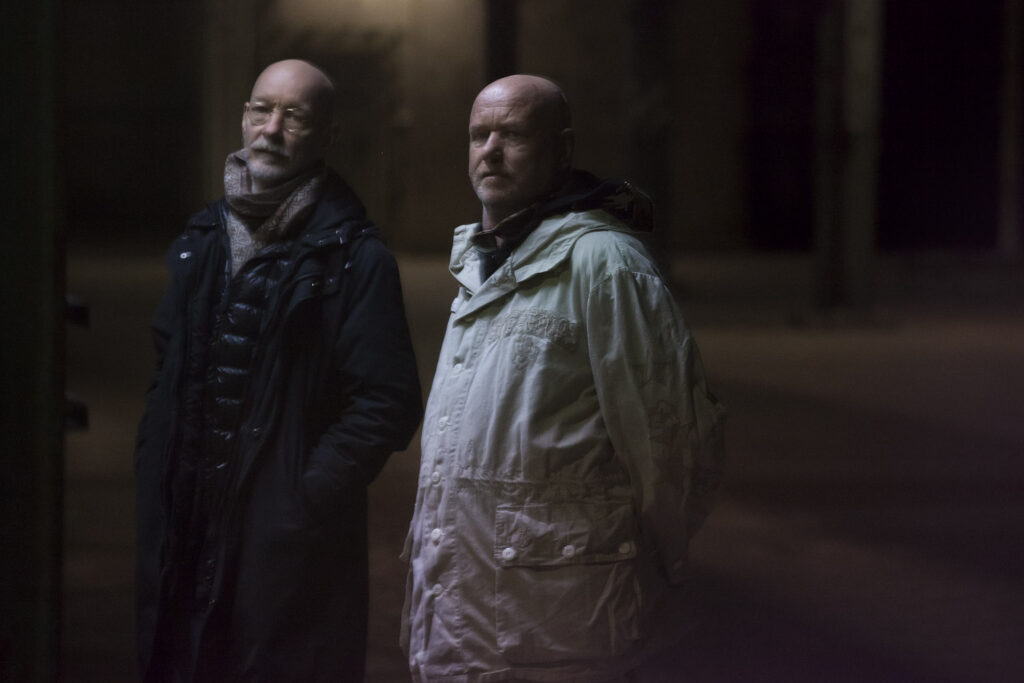
By this point, punk’s imperative to keep things curt and tapered and tight-arsed was wearing thin. The Orb found a way of making music expansive in a manner that was in line with the punk spirit – by revisiting the minimalism of ambient and adding their own, facetious twist. They thrived by creating extended soundtracks for the comedown period experienced by ravers in the wee hours. Chill was born and The Orb took up a residency at Heaven in London, brought in by Paul Oakenfold as part of his Land Of Oz club nights. But what was to become the stuff of legend initially appealed to a very small if attentive coterie.
“It wasn’t huge at all,” says Paterson. “It was a builder. We put ‘Pulsating Brain’ out in February 1989 but we’d been demo-ing it to friends during the summer of 1988. We kind of stumbled across this idea of naming our music, calling it something that was different, so we became the pioneers of our own music. The KLF did it too, but they stopped, and I know Jimmy Cauty has always kicked himself for that. He always wished me well for sticking with it.”
What kind of kit did you use in the early days? And are you nostalgic for the old ways?
“It’s fucking easier now. Much easier. Time was when I had records, CDs, cassette machines, old TVs, old video players – this was back in the Land Of Oz days – but now you can get all of that on a couple of laptops. Actually, today I use CD players. It was getting worse and worse with vinyl when I was touring, especially in America. It would have to be turned down, have the bass end taken out, they never understood that I needed a concrete slab, even though it was on the rider. They’d be saying, ‘What you need that for, man?’.
“Then one night, I tried three CD players. That was it. I suddenly fell in love with three CD players. The precision of what you can do with them is quite stunningly scary. You can link CD players together so they read each other and then they can play in time with each other. This is just in the last five years. So that’s what I use now.”
Paterson is still a believer in the lost merits of vinyl, though. He’s currently revelling in his new favourite record shop in West Norwood and he’s excited that The Orb’s 1991 debut album, ‘The Orb’s Adventures In The Ultraworld’, is about to be reissued as a quadruple vinyl set. But despite the vinyl resurgence, he believes such enterprises are becoming increasingly difficult.
“The record pressing plants are all in the Czech Republic these days – and there’s a waiting list,” he says. “Then there are the lathes that cut the music onto the vinyl. There’s only about five or six of these left in the country. In about 20 years time, there’ll be no one left who’s able to make these things. A lost craft.
“You’re getting young people coming into record shops saying, ‘Can I get a record player?’. Then they say, ‘How does it work?’. I was thinking about how jungle is actually just reggae speeded up – put an old reggae album on at 45 rpm and you have drum ’n’ bass – but young people wouldn’t know that because they don’t have record players! I’ve got decks that pitch down to zero. Down to zero and then up to 360 bpm. And they can go backwards. You can focus on tiny little milliseconds that enable you to put a pinprick in the song you’re making. And then those pinpricks become a sketch.”
Sketching and sampling are as important to The Orb’s creative process in 2015 as they were at the outset. As with DJ Shadow and the late J Dilla (to whom Paterson pays tribute on ‘Dilla’s Moon Quake’, a bonus track on the vinyl version of ‘Moonbuilding 2703 AD’ which features 15 of Dilla’s loops), Paterson has always regarded sampling as an art form, rather than pilfering.
“Can I let you into a secret?” he grins, leaning in like Max Miller about to deliver a particularly blue gag at a variety show. “The whole of the new album is made of samples. Every last bit. Every last note. It’s assembled from other things. It doesn’t have to be other records, you know.”
Paterson takes pride in the obscurity of his samples, often so micro that they are undetectable to the copyright police, but he was caught bang to rights by Steve Reich and Rickie Lee Jones with ‘Little Fluffy Clouds’. The two artists demanded financial cuts from the release, but Paterson says they both came to like what he’d done with the track.
“Rickie loved the song, she just asked for $5,000 for the vocal,” he shrugs.
It was as a comment on outdated notions of effort and authenticity in modern music that The Orb famously sat and played chess when appearing on ‘Top Of The Pops’ in 1992 to “perform” their extended single ‘The Blue Room’.
“My brother used to be in a band who supported Blue Mink in the 70s, and I remember watching ‘Top Of The Pops’ when Blue Mink were on and my brother was just laughing,” says Paterson. “I asked him what was so funny and he said, ‘Well, that’s the singer and he’s drumming, that’s the bass player and he’s playing guitar’. So I said, ‘How can they do that?’. And he said, ‘Because they’re miming’, and then he told me how the musicians used to swap positions if they thought they could get away with it. That was my first inkling of that.”
An awful lot of today’s technology is smaller than a chessboard. Which means that, when it comes to playing live, everything is much more manageable than it used to be.
“We used to have 40-foot stacks with lighting, but now we only need a laptop,” says Paterson. “We used to have 24-track mixers, but now we only need a couple of outboard boxes and computers with a couple of programmes like Ableton.”
Getting in front of audiences, whether DJing or performing live, has helped The Orb maintain a steady profile over the years, especially during the period when they were left in the lurch by their record label at the very tail end of the 90s. And it’s in the live environment that Paterson has genially crossed swords with many of his contemporaries, even if he didn’t always recognise them.
“Last time I played Glastonbury, I came off the stage and saw this bloke and had a bit of a chat with him, American geezer he was, and at the end he said, ‘Hey man, here’s my card, stay in touch’. It was only Chuck D out of Public Enemy. And I didn’t know who he was. But he was great about that. Contrast with another time when I’m backstage at this Laurent Garnier gig in Italy and this guy starts asking me what I’m doing, you know, like I’ve no business being there. I tell him who I am and suddenly he’s fawning all over me. Why do people have to be like that?”
Paterson suffered another adverse experience in Italy, when he decided to conduct an experiment in sexual equality.
“It was at a club in Rimini, full of all these beautiful women with body paint on. They were all naked from the waist up. So I decided to take my shirt off too, just before I go on stage. And someone says, ‘Ey! What are you doing? Put your shirt back on!’. And I’m, like, ‘What’s the difference? Well, alright, fair enough’. At the end of the night, I was queuing up, waiting to get paid, and all these women were queuing as well, waiting to get paid too.”
Paterson adds that The Orb have had some of their best live experiences in Japan.
“We’ve been going every year since 1991. We did Fuji a lot last year. Went down a storm there. They invited me to DJ at the Tokyo Dome to 55,000 people a night, which scared the living daylights out of me. A beautiful sound system – hear a pin drop yet with a sub-bass that’ll knock your knees out. When it comes to festivals, we could learn from the Japanese about keeping our environment clean and how to be proud of what we are instead of worrying about the government cleaning up after us. It’s our mess, so we should do it. The Japanese are very good at it. Everything is recyclable.”
Talking about recycling, how do The Orb see themselves in relation to EDM? Curse or blessing?
“It’ll shoot itself in the foot eventually and then the cycle will begin all over again. For us, it doesn’t really have any effect because we have our selection of hits that people come back to. Even our recent stuff with Lee ‘Scratch’ Perry. ‘Fluffy’ is always going to be at the top, I’m afraid. I’m used to it now!”
Immense as is the space they have traversed, ultimately, The Orb are what The Orb are.
“Johnny Rotten came and saw us play one night,” says Paterson. “I’d had some history with him – our paths had crossed during my Killing Joke days – and he came up to me and said, ‘Alex, I think The Orb are beautifully boring’. And that about sums it up! That’s the whole idea, really. It gives you the time and space to unclutter your mind.”
‘Moonbuilding 2073 AD’ is out on Kompakt
